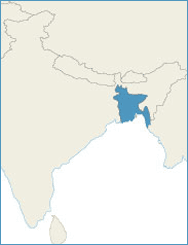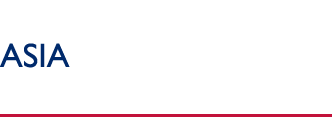 |
|
 |
 |
 |
| USAID Information:
External Links:
|
|
 |
 |
|
 |
 |
|
Bangladesh

SNAPSHOT
Date of independence: 1971
Capital: Dhaka
Population: 144.3 million (2006)
Income per person: $480 (yr)
Source: World Bank Development Indicators 2006
USAID IN BANGLADESH
www.usaid.gov/bd/
CONTACTS
Mission Director
Denise Rollins
USAID/Bangladesh
Department of State
Washington, DC 20521-6120
Tel: 880-2-885-5500
Renee Howell
Bangladesh Desk Officer
Tel: (202) 712-5919
Email: rhowell@usaid.gov

A 60-year-old resident of one of the cyclone-affected areas of Bangladesh receives flour, oil, and peas from USAID after Cyclone Sidr hit in November 2007 and claimed more than 3,000 lives. USAID’s emergency relief and rehabilitation efforts helped thousands of hungry and destitute Bangladeshis to recover in the aftermath of Cyclone Sidr. Overview
Bangladesh, a key ally of the United States, is one of the most densely populated and poorest countries in the world. The country, a moderate Muslim majority, has a population of 144 million. American assistance to Bangladesh includes support for the return to democracy through free, fair, and credible elections and more transparent and accountable governance; support for a better educated, healthier, and more productive population; and assistance to increase economic opportunities through equitable economic growth, improved food security, and disaster mitigation.
Programs
Investing In People: Health and Education
Working with NGOs and the private sector, USAID supports the government of Bangladesh by funding technical assistance for selected public sector programs to expand family planning services and health care for the poor. USAID programs serve one-third of all couples using modern family planning methods. In 2007, USAID-funded programs provided pregnancy-related care to about 450,000 pregnant women, mostly from poor households. USAID’s HIV/AIDS programs reached 1.5 million people with prevention messages, counseling services, and treatment for sexually transmitted infections.
Although enrollment in primary school has improved in recent years, an estimated 40 percent of children still do not complete the second grade. USAID’s pioneering work in early childhood education, including its support for 1,800 preschools and learning programs for older children, improves schools’ ability to address poor attendance, low achievement, and high drop-out rates in primary school. The USAID-funded Sesame Street television program “Sisimpur”, the most widely viewed children’s television program in Bangladesh, reaches over 7.5 million viewers weekly.
Humanitarian Assistance: Improving Disaster Response
Frequent natural disasters in Bangladesh imperil the livelihoods of the poor, damage property, destroy vital infrastructure, and disrupt economic and social activities. USAID-funded activities help communities to better prepare for disasters. Our projects work with local government officials, community leaders, and volunteers to develop emergency response plans, increase public awareness, and take the actions required to increase their communities’ ability to respond to emergency events. Since 2005, USAID has funded nearly 4,000 construction projects to fortify barriers against flooding. In 2007, USAID’s disaster relief programs provided emergency survival packages to over 300,000 people
Increasing Economic Growth
USAID’s economic growth program is focused on improving opportunities for poor and disadvantaged groups. The program works to develop and expand private sector business, improve access to electricity in rural areas, and enhance environmental management. All three areas are targeted to the most vulnerable populations of Bangladesh.
Electricity improves economic opportunities and quality of life. In 1971, only 3 percent of the population had electricity. Today, 33 percent do. USAID’s most significant contribution has been to help bring energy to rural areas. In 2006, new rural connections averaged 1,100 per day, bringing the total number of rural connections to 7.4 million.
To protect natural resources and empower local people who depend on them, USAID works with communities to establish management systems that encourage the wise use of aquatic and tropical forest resources and restore habitats and ecosystems. Almost 20,000 hectares in three major floodplains and 25,000 hectares of protected natural forest area are now under co-management, which empowers local communities to take ownership to manage their natural resources. Eighty fish sanctuaries in three freshwater ecosystems increased fish production by 50 percent. Eight community-led co-management committees now manage five protected forest areas, where illegal logging has virtually stopped and communities are harnessing better livelihoods.
Governing Justly and Democratically
Large- and small-scale corruption threatens the cou
resources. To fight this trend, USAID programs address the root causes of pervasive corruption by improving the quality of governance by elected leaders, developing fair and open election processes, improving the functioning of political parties, and increasing parliamentary and citizeoversight of the national budget. USAID also works with NGOs, locally egovernments, and municipal associations to improve accountability and the delivery of social services. These efforts have led to direct budget allocationfrom the national government to local government associations for the first time ever and a 50 percent increase in local revenues in targeted areas.
Peace and Security: Combatting Human Trafficking
With USAID’s support, the Bangladeshi government made significant progress in dealing with human trafficking, removing the country from prospective sanctions. USAID provided assistance to 400 trafficking survivors since 2006.
Back to Top ^
|


